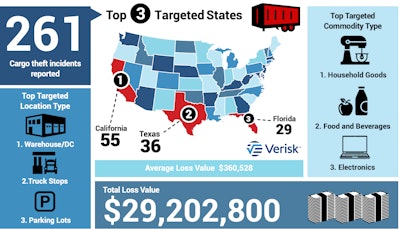Trucking news and briefs for Friday, Dec. 20, 2024:
Truck parking recommendations emerge from advisory committee meeting
The Federal Motor Carrier Safety Administration's Motor Carrier Safety Advisory Committee met on Tuesday and Wednesday of this week to discuss the truck parking shortage and how federal dollars and authorities can help.
The discussion went almost all day Tuesday and wrapped up Wednesday morning with a list of recommendations for the federal government. A wide range of ideas and issues considered came from industry participants as FMCSA's Associate Administrator for Policy Larry Minor and other officials listened on.
Owner-Operator Independent Driver Association President Todd Spencer was on hand to keep the talk focused on what he felt was the core issue: The need for more actual spots.
Participants discussed the usefulness of highway signage advertising truck parking, as well as the dominance of apps in the truck parking space and their shortfalls. The discussion veered into data privacy concerns with apps like Trucker Path and even some discussion of the federal government aggregating truck parking data and centralizing it to either share with other apps drivers already use, like Drivewyze, or to create a new app.
Ultimately, the committee declined to recommend the government create its own app.

"We just need more places to park," said Spencer. "That should be the priority, to the extent that we can identify barriers to construction of these spots, we should do that and find ways to resolve some of these barriers."
The committee will recommend to the Department of Transportation that it build more truck parking, reach out to states about how they're increasing parking, identify some actionable short-term solutions, and use the results of an upcoming Jason's Law survey to better guide federal dollars.
[Related: Truck parking projects in three states get millions in funding]
Don’t let the grinch steal your cargo this holiday season
The combination of extended holiday closures, reduced staffing levels and stressed compliance resources over the next couple of weeks creates an environment ripe for cargo thieves.
Cargo theft recording firm CargoNet reported that cargo theft activity has already reached unprecedented levels across the U.S. this year already, with reported incidents 12% higher than the total recorded in 2023.
Analysis of holiday-period theft data from the past five years reveals a concerning pattern that indicates heightened risk during the upcoming Christmas and New Year celebrations, the firm noted.
"The days immediately following Christmas have historically been the most active for cargo thieves," said Keith Lewis, vice president of operations at CargoNet "Our analysis of 261 theft events between December 23 and January 2 over the past five years shows December 27 and 29 as peak days for criminal activity, with 31 reported incidents each."
 CargoNet has tracked 261 cargo theft incidents between Dec. 23 and Jan. 2 over the last 5 years worth more than $29 million.CargoNet
CargoNet has tracked 261 cargo theft incidents between Dec. 23 and Jan. 2 over the last 5 years worth more than $29 million.CargoNet
The increasing sophistication of cargo theft operations has contributed to a steady rise in holiday season incidents. The 2019-2021 holiday seasons averaged 43 events per year, before jumping to 59 in 2022 and reaching 73 in 2023. Current trends suggest that this upward trajectory will continue through the 2024 holiday period.
California, Texas, and Florida remain the most targeted states for cargo theft. At the county level, Shelby County, Tennessee leads, followed by Dallas County, Texas, and both San Bernardino and Los Angeles counties in California.
Thieves have shown particular interest in specific commodities. Vehicle accessories such as motor oil, auto parts, and tires top the list, followed by televisions and other display screens and alcoholic beverages.
While sophisticated fraud schemes are increasing, traditional theft methods -- including theft of trailers and full load theft -- continue to account for the majority of incidents.
The surge in criminal activity has been particularly dramatic in 2024. As of Dec. 18, reported incidents have already surpassed all of 2023 by several hundred incidents. The increase has been especially pronounced in key states, with Texas seeing a 36% rise and California experiencing a 21% increase in reported incidents.
Tips for protecting cargo in-transit include:
- Make sure that both security managers and drivers have accurate license plate, VIN, and descriptive information for tractors, trailers, containers, and container chassis. Police agencies will need this information to open an investigation in the event of an incident. Drivers should keep this information on them so they can quickly reference it if their truck is stolen.
- Secure all trailers (loaded and unloaded) with high-security ISO 17712-compliant barrier seals in combination with hardened padlocks. Use king pin locks for unattached trailers.
- Secure all tractors with high-security locking devices, such as air-cuff and steering column locks.
- Remind drivers to arrive at point of pickup well-rested, showered, and fed and with a full tank of fuel.
- Avoid having loaded trailers sit unattended when employees are not present.
Congress passes bill to streamline TSA credentialing
After passing in the U.S. Senate last month, the U.S. House this week passed the Transportation Security Screening Modernization Act. If enacted, the legislation would streamline the credentialing process for certain Transportation Security Administration-managed programs, such as the Hazardous Materials Endorsement (HME) and the Transportation Worker Identification Credential (TWIC). It would allow workers to apply existing valid background checks to multiple credentialing programs.
The language of the bill requires the administrator of the TSA to take action within two years of the bill being signed into law. It also requires that individuals applying for more than one TSA security threat assessment program at the same time be charged a fee that is less than the cumulative fee that would otherwise be charged if applying for the programs separately.
The bill’s passage received immediate praise from the American Trucking Associations, which has for years been pushing for the legislation.
“For far too long, the truck drivers who keep our country running have been subjected to an outdated, inefficient credentialing system that does not respect their time and money,” said ATA President Chris Spear. “That begins to change today. By taking the final step needed to eliminate unnecessary bureaucratic hurdles, Congress will provide essential supply chain workers with overdue relief from redundant background checks and fees.”









